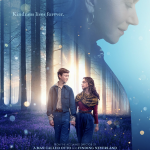After living life on the edge in London, Rona attempts to come to terms with her troubled past. Hoping to heal, she returns to the wild beauty of Scotland’s Orkney Islands where she grew up.
Chuck says:
Nora Fingshceidt’s adaptation of Amy Liptrot’s memoir “The Outrun” tells the story of one woman’s struggles with addiction and the ultimate salvation that she finds. As such, it’s a deeply relatable story, its reach extending towards those who suffer from any sort of debilitating condition that might lead them to abandon any hope of recovery. Therefore, it’s unfortunate that the film is a bit of a muddle, Fingshceidt taking an overly arty approach to the material that, in the end, proves vexing. That being said, the lead performance from Saoirse Ronan is nearly worth the price of admission, the actress delivering a deeply moving portrayal of a woman incapable of quelling her demons, her salvation ever elusive.
Taking place on the Orkney Islands in Scotland, Rona (Ronan) is unmoored, having returned to her parents’ isolated sheep farm after leaving rehab. Through flashbacks, some brought about through moments of PTSD, we she her recent past in London, the events that led to her current state. Drinking to the point of blacking out, her alcoholism had taken control of her, leading to her losing her job and being unemployable, as well as ostracizing her friends, including her longtime boyfriend, Daynin (Paapa Essiedu).
Only after being assaulted while inebriated does she seek help, her journey towards sobriety one she does not fully embrace. As such, her recovery is not without its setbacks, promising starts being scuttled once the stress of life becomes too much, or when she spends too much time with her father (Stephan Dillane). Having been diagnosed as bi-polar, his condition had a profound effect on Rona as a child, while his continued lack of progress towards stability sowing doubt that she could ever succeed in her own recovery.
Fingshceidt’s choice to tell Rona’s tale in a non-linear manner to reflect her scattered state of mind looks good on paper but fails to translate to the screen. The result is a fractured, frustrating experience that requires an investment from the viewer not all will be willing to make. The intent of the movie’s style and approach is admirable yet, in the end, flawed.
The script by Fingshceidt and Liptrot is layered and intelligent, allusions made throughout to the climate and culture of Scotland. Connections to weather phenomenon and folklore, all involving transformation, are recounted in an effort to connect them to Rona’s own efforts to change. Most moving is the tale of the selkie, a mythical creature that shapeshifts from seal to human, but can be easily separated from its home. The connection between them and Rona is referred to throughout, culminating in a genuinely poignant third-act breakthrough.
Ronan has always been one of her generation’s most capable actresses and one who consistently challenges herself as well. In many ways, this is her best, most nuanced performance, a turn that taps into deep wells of pain and doubt the actress displays with abandon. Required to run a gamut of emotions, she’s captivating throughout, demanding our attention not simply because of her efforts but to take note of Rona’s suffering and courage.
Ronan carries the film, keeping us engaged even as Fingshceidt’s approach keeps us at arm’s length. While “The Outrun” is noble in its intent and its lead’s performance is well-worth recognition, its lack of accessibility ultimately dulls its impact.
2 1/2 Stars




